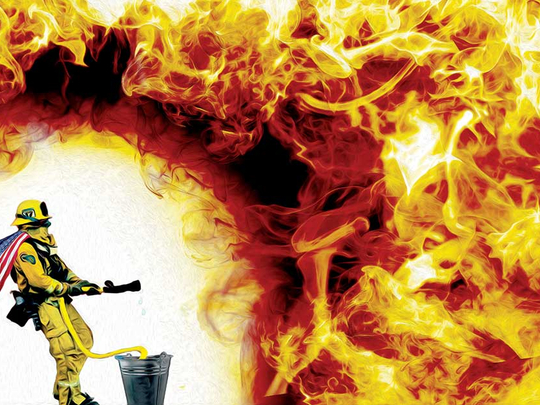
If, as a child, you had joined the Boy Scout movement — whose goal is to train the youth in responsible citizenship, character development and unswerving honesty — you would have been told from the outset that, in order to earn respect in the adult world you will join later in life, you should keep every promise you make and make only those promises you can keep.
United States President Barack Obama, it now appears, has deep pockets when it comes to promises about Syria, which he has found inconvenient to honour.
One of the first promises he made was in April 2012, during an address at the US Holocaust Memorial Museum in Washington, in which he made a pledge to help the people of Syria, who were being “subjected to unspeakable violence” by their government. He asserted that preventing “mass atrocities” (read, war crimes) is a “core national security interest and a core moral responsibility of the United States of America”.
Though he added the caveat that the US would not “intervene militarily every time there’s an injustice in the world”, he claimed that as far as Syria was concerned, he had the Syrian people’s back. “The Syrian people have not given up, which is why we cannot give up. And so with allies and partners, we will keep increasing the pressure with a diplomatic effort to further isolate [Bashar Al] Assad and his regime so that those who stick with him know that they are making a losing a bet”.
As it turned out, those who stuck with the Syrian dictator and took the bet, namely Russia and Iran, along with Shiite militias from Lebanon and Iraq, have made a fortune.
Many more atrocities later, Obama, leader of the free world, leader of the nation that presents itself as a moral exemplar to the rest of us, later made another promise: If Al Assad used toxic gas on his own people, that would entail the crossing of a “red line” — and the US would then be ready, able and willing to take action.
Well, the Syrian regime did just that when in August 2013, it used chlorine gas on the civilian population of Gouta in suburban Damascus. The resulting carnage was so dreadful that when footage of it was shown to the United Nations Security Council — writhing children on stretchers carried into ill-equipped hospitals, men choking and vomiting blood, with others exhibiting unbearably painful blisters and burns — the UN delegates were reportedly moved to tears.
Still Obama took no action, certainly not the kind that one would’ve recognised as the right one to take against a war criminal who had brazenly crossed that putative “red line”.
Emboldened, Al Assad went on to launch, according to the Organisation for the Prohibition of Chemical Weapons, at least 60 similar attacks in the country, with equally devastating results.
Debris-strewn landscape
All of which brings us to the recent mayhem in Aleppo, or what’s left of this Syrian city — for centuries the largest metropolis in Syria and the third largest in the Ottoman Empire, after Istanbul and Cairo, but today a debris-strewn landscape.
Earlier this month, at a Pentagon news conference, Obama declared blandly that “the regime and its allies are engaged in vicious attacks on defenceless civilians, medieval sieges against cities like Aleppo, and blocking food from reaching families that are starving”. He then added, equally blandly: “It is deplorable.” And left it at that. When the leader of the free world talks blandly about what in effect is a gut-wrenching situation, you know that we have, well, crossed a line. You know that we have got to a point that plucks at one of the major, hidden chords of our human selves: Our ability to sublimate horror, to cease turning in pain and disbelief at atrocity, to adjust the monstrous to fit our beliefs. In short, to become desensitised, less emotionally-nauseated by “the banality of evil”.
And we do that at times as part of a defence mechanism, a strategy aimed at protecting our internal psychic economy from an overload, even collapse. In Nazi Germany, for example, even in the middle of the carnage, life was in full tide and moved forward with a wild gaiety. No, literacy of feeling is not a precondition to sane judgement of human affairs. Evil is indeed banal.
Wen Obama, during his visit to the Pentagon earlier this month, said, identifying Aleppo’s tragedy, “It is deplorable”, the Washington Post excoriating him for opting to do nothing about it all and concluded: “Small comfort to the people [there]”.
Small comfort indeed to the millions of Syrians living under siege, small comfort to the families of the hundreds of thousands killed in the conflict so far, small comfort to the roughly million people who have been wounded and the 12 million Syrians, half the pre-war population, forced from their homes, wandering as internal refugees or seeking shelter in other countries.
Meanwhile, the Russians, now with access to air bases in Iran, last week launched their first bombers from there — in concentrated raids on, you guessed it, Aleppo. And, sorry, but the White House is out to lunch and the folks at the State Department, according to its deputy spokesman, Mark Toner, are “still trying to access exactly what they are doing”.
Fawaz Turki is a journalist, lecturer and author based in Washington. He is the author of The Disinherited: Journal of a Palestinian Exile.








